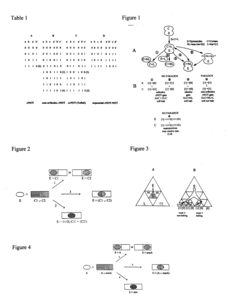Bieberich, Erhard (1999) What the liar paradox can reveal about the structure of our minds. [Preprint]
Full text available as:
![[img]](1.hassmallThumbnailVersion/liarfigures4.gif)
|
Other
76Kb | |
|
HTML
37Kb |
Abstract
In human consciousness perceptions are distinct or atomistic events despite being perceived by an apparently undivided inner observer. This paper applies both classical (Boolean) and quantum logic to analysis of the Liar paradox which is taken as a typical example of a self-referential negation in the perception space of an undivided observer. The conception of self-referential paradoxes is a unique ability of the human mind still lacking an explanation on the basis of logic. It will be shown that both classical and quantum logics fail to resolve the paradox because of the particle-like (atomistic) nature of physical events in the moments of perception. The atomistic reality is the only one observed in human consciousness even if, as has been claimed by a number of authors, consciousness arises from a quantum mechanical superposition. However, a computational solution of the paradox can be achieved by embedding quantum registers in a fractal space. The truth values, or q-bit eigenstates, of the separate parts of the paradox correspond to sub-spaces of the fractal. Since a fractal contains the whole in each part a self-referential negation emerges as the experienced concept in each sub-space. Fractal quantum computation is realized by a cNOT-operation with percolation of the control q-bits into sub-spaces of a nascent fractal. In other words, atomism cannot cope with a self-referential paradox but quantum logic gates embedded in a fractal structure can cope. Remarkably, it will be shown that a mind operating on these algorithmic principles will not inevitably be limited by Turing's halting theorem. I suggest a physical mechanism that can deal with our experience of self-referential paradox. Because it is also shown that this cannot be achieved by any previously suggested classical or quantum mechanical operation, the newly proposed mechanism provides a better model than others for an important aspect of the structure of our minds.
| Item Type: | Preprint |
|---|---|
| Keywords: | fractal, liar paradox, halting problem, Turing, consciousness, mind, quantum logic, cNOT gate |
| Subjects: | Philosophy > Philosophy of Mind |
| ID Code: | 1210 |
| Deposited By: | Bieberich, Erhard |
| Deposited On: | 18 Jan 2001 |
| Last Modified: | 11 Mar 2011 08:54 |
Metadata
- ASCII Citation
- Atom
- BibTeX
- Dublin Core
- EP3 XML
- EPrints Application Profile (experimental)
- EndNote
- HTML Citation
- ID Plus Text Citation
- JSON
- METS
- MODS
- MPEG-21 DIDL
- OpenURL ContextObject
- OpenURL ContextObject in Span
- RDF+N-Triples
- RDF+N3
- RDF+XML
- Refer
- Reference Manager
- Search Data Dump
- Simple Metadata
- YAML
Repository Staff Only: item control page


